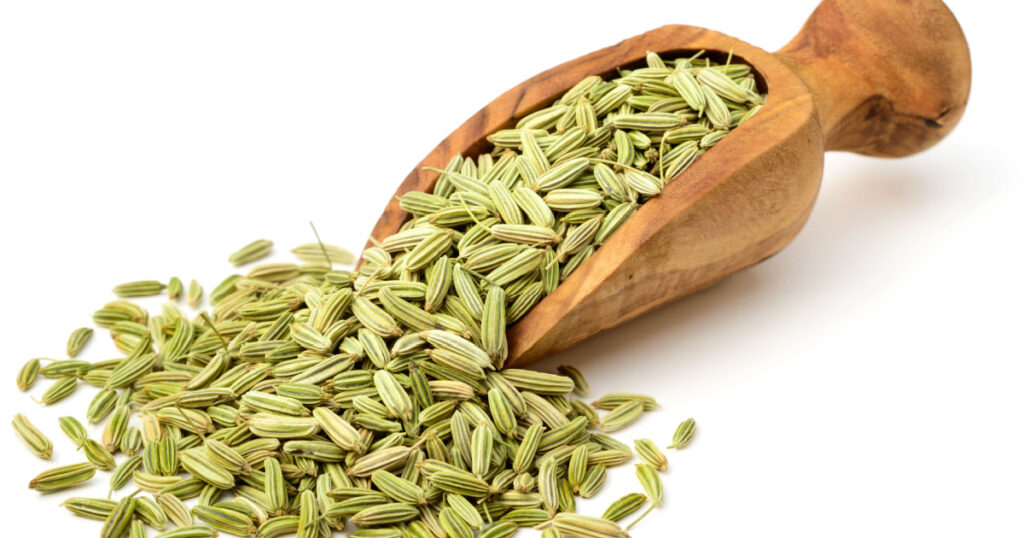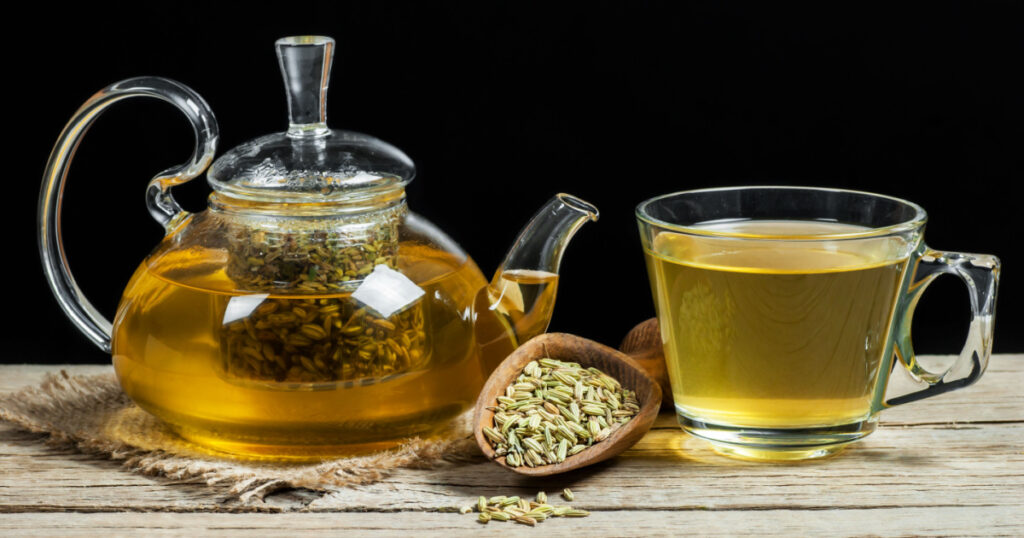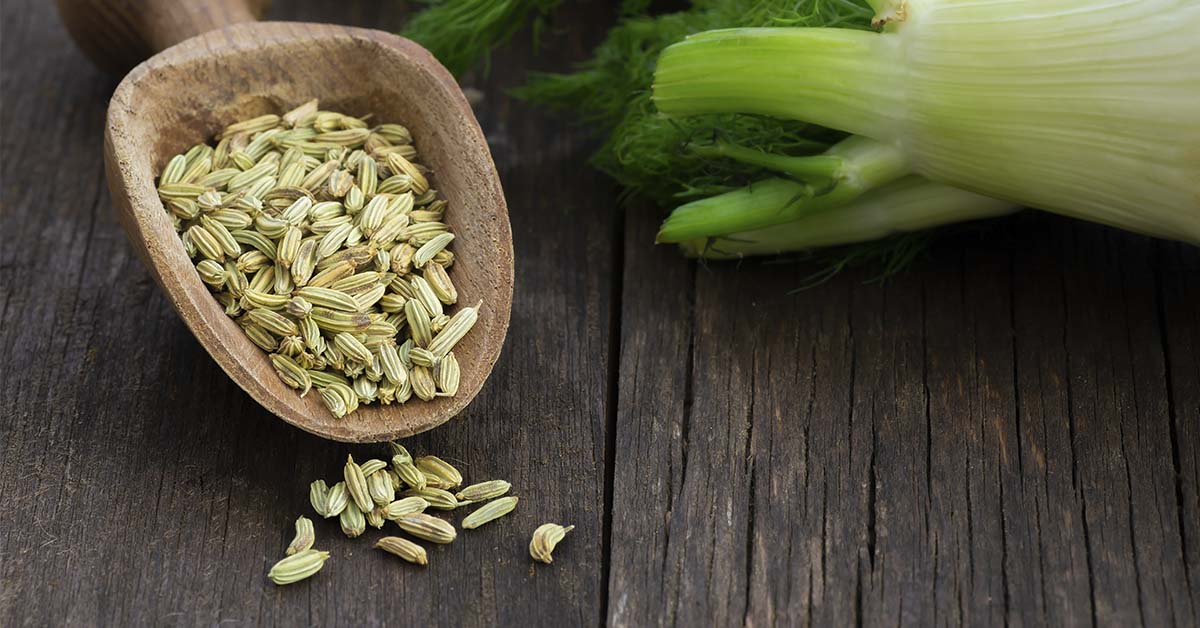Fennel, commonly known as Foeniculum vulgare, is a flowering plant that belongs to the carrot family. It is native to the Mediterranean region but is now cultivated in many parts of the world. The ancient Romans supposedly referred to it as “the herb of sight” due to its alleged benefits for eye health. Some new research is showing that this might actually be true.
Fennel, Fennel Seeds, and Their Benefits
Fennel seeds, derived from the fennel plant, are widely used in cuisines for their aromatic flavor. Fennel seeds have also been associated with several health benefits besides their culinary use. Although much of the evidence supporting these benefits is based on traditional use and animal studies, they are still worth exploring. While fennel can’t necessarily replace modern medicine, some evidence suggests it can help. (1)
1. Digestive Health

Fennel seeds have long been used as a natural remedy for digestive issues such as bloating, indigestion, and flatulence. Their carminative properties help to relieve intestinal spasms, reducing discomfort and promoting better digestion. They are also used as a breath freshener, which is why fennel seeds are often chewed after a meal. Research shows that fennel helps to prevent the development of stomach ulcers and alleviate symptoms such as abdominal pain, nausea and vomiting caused by gastric reflux disease (GERD). (2)
2. Antioxidant Properties

Fennel seeds contain antioxidants like flavonoids and phenolic compounds that help protect the body against oxidative stress. These antioxidants neutralize harmful free radicals, reducing the risk of chronic diseases and supporting overall health. Fennel seeds have been found to have anti-cancer properties that help prevent the development of several types of cancer, including uterine, ovarian, and prostate cancer. They contain high amounts of phytonutrients, which have been shown to inhibit tumor growth in some studies. (3)
Read: 8 Useful Herbs for Memory and Brain Health
3. Eye Health

Some studies suggest that extracts of fennel seeds may have potential benefits for vision and eyesight. Animal studies have shown that these extracts could have potential use in the treatment of glaucoma, a condition that damages the optic nerve and can lead to vision loss if left untreated. Studies also found that fennel extracts could also help protect against cataracts, a condition in which the lenses of the eyes become cloudy and develop hard-to-correct vision defects. (4)
4. Diuretic Properties

Fennel seeds have diuretic properties, meaning they can increase urine production and promote the elimination of excess fluids and toxins from the body. This property may be beneficial for individuals with conditions such as hypertension, as reducing excess fluid levels may help lower blood pressure. (5)
5. Anti-Inflammatory Properties

Fennel seeds contain compounds with anti-inflammatory properties, such as anethole and quercetin. These compounds have been found to inhibit the production of inflammatory molecules, thereby reducing inflammation in the body. Regularly consuming fennel seeds may help alleviate symptoms of inflammatory conditions like arthritis and asthma. (6)
6. Oral Health

Chewing fennel seeds can help freshen breath and improve oral health. Fennel seeds have antimicrobial properties that can fight mouth bacteria, reducing gum disease and cavities risk. Additionally, their natural aromatic compounds can leave a pleasant taste and scent in the mouth. (7)
7. Respiratory Health

Fennel seeds have expectorant properties that can help loosen phlegm and mucus in the respiratory tract, making coughing and alleviating congestion easier. They are often used as a natural remedy for respiratory problems like coughs, bronchitis, and asthma. (8)
The Bottom Line
It is important to note that while fennel seeds have been used traditionally for various purposes, scientific evidence for their benefits is still limited. More research is needed to provide stronger support for their potential health effects. As with any dietary supplement or remedy, it is always advisable to consult with a healthcare professional before incorporating fennel seeds or any other herbal remedy into your routine.
Overall, fennel and fennel seeds can be a flavorful addition to your dishes, and while they may offer some potential health benefits, it’s always best to maintain a balanced diet and consult a healthcare professional for personalized advice.
Keep Reading: 24 Of The Most Weight Loss Friendly Foods on The Planet
Sources
- “Foeniculum vulgare: A comprehensive review of its traditional use, phytochemistry, pharmacology, and safety.” Science Direct. Manzoor A. Rather, et al. November 2016.
- “Foeniculum vulgare Mill: A Review of Its Botany, Phytochemistry, Pharmacology, Contemporary Application, and Toxicology.” NCBI. Shamkant B. Badgujar, et al. August 2014.
- “Phenolics and Volatile Compounds of Fennel (Foeniculum vulgare) Seeds and Their Sprouts Prevent Oxidative DNA Damage and Ameliorates CCl4-Induced Hepatotoxicity and Oxidative Stress in Rats.” NCBI. Hassan Barakat, et al. November 2022.
- “Indian traditional medicinal plants in ophthalmic diseases.” NCBI. Sana Nafees, et. November- December 2022.
- “Chapter 55 – Usage and Significance of Fennel (Foeniculum vulgare Mill.) Seeds in Eastern Medicine.” Science Direct. Hafiz Abubaker Saddiqi and Zafar Iqbal. 2011.
- https://www.ncbi.nlm.nih.gov/pmc/articles/PMC8545060/
- https://pubmed.ncbi.nlm.nih.gov/33753665/
- https://www.ncbi.nlm.nih.gov/pmc/articles/PMC4137549/

